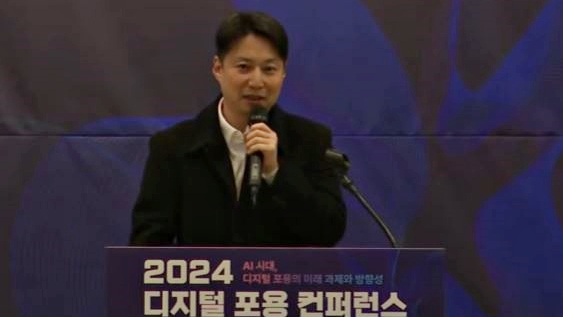AI 및 디지털의 급속한 발전으로 앱 없이는 택시 잡기, 열차 예약, 식당 이용 등이 불가능할 정도 디지털 장벽이 높아졌다. 이에 디지털 격차를 해소하고 포용 사회를 만들기 위한 논의의 장이 열렸다.

▲2024 디지털 포용 컨퍼런스 화면 캡처
NIA 디지털 포용 컨퍼런스 개최
삼성, AI 기반 접근성 기술 소개
AI 및 디지털의 급속한 발전으로 앱 없이는 택시 잡기, 열차 예약, 식당 이용 등이 불가능할 정도 디지털 장벽이 높아졌다. 이에 디지털 격차를 해소하고 포용 사회를 만들기 위한 논의의 장이 열렸다.
2024 디지털 포용 컨퍼런스가 20일 서울 영등포구 FKI 타워에서 한국지능정보사회진흥원(NIA) 주관으로 개최했다.
AI 시대 디지털 포용의 미래 과제와 방향성을 주제로 개최된 이번 행사는 AI 시대 급격한 발전에 의한 디지털 권리 침해, 격차 심화 등의 사회적 이슈를 논의하고 이에 대응하는 정책 방향을 제시했다.
△삼성전자 △신한은행 △포스코이앤씨 등 기업들이 참여해 민간에서의 디저털 포용 활동 사례를 발표했다.
이의윤 삼성전자 프로는 접근성 기능을 도약시킨 삼성전자의 AI 기술을 소개했다. 삼성 스마트TV의 리모컨 음량 버튼을 길게 누르면 삼성이 개발한 접근성 메뉴에 진입할 수 있다고 설명했다.
AI 기술이 탑재된 △저시력자들을 위한 릴루미노 모드 △영상 내 텍스트를 AI로 검출하는 들리는 자막 △수어통역사 확대 기능 △제스처 인식을 통한 화면 기능 설정 등이 개발돼 적용됐으며, 향후 더 다양한 접근성 기능이 확대될 것으로 전망된다.
현재 삼성전자 스마트TV에 탑재된 접근성 기능은 총 24가지로 수어 확대 기능은 CES 최고혁신상을 받은 바 있다.
과학기술정보통신부는 디지털 포용사회 2.0 추진방향으로 전국민 대상 디지털 보편적 권리를 보장하는 기업 및 시장의 산업 거버넌스 중심으로 정책을 추진한다고 전했다. △디지털 배움터 지역거점 플랫폼 구축 △SNS 중독 대응법 등 디지털 과의존 예방 정책 수립 △디지털 포용사회 얼라이언스 설치 및 운영 △디지털 포용법 제정 등이 추진된다.